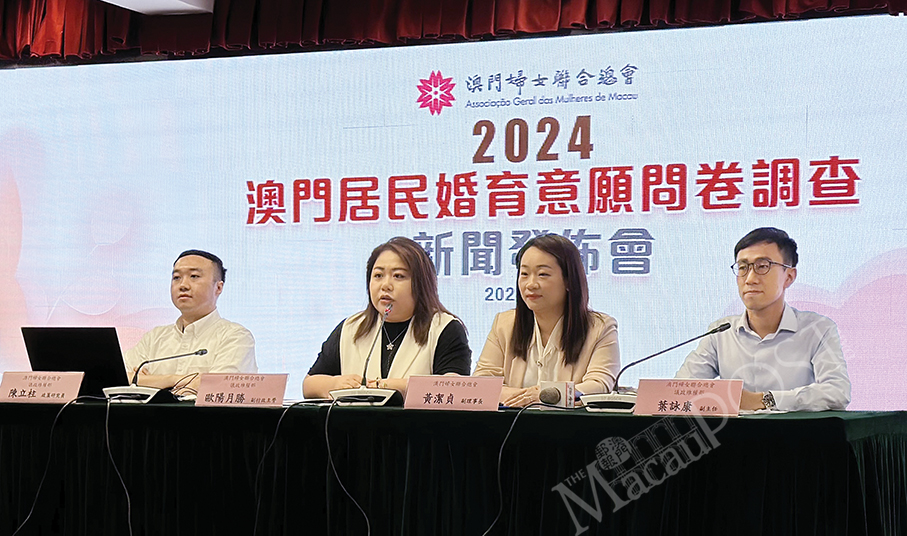The Women’s General Association of Macau has conducted a survey about young residents’ attitudes towards marriage and childbearing, the results of which show that nearly half of the 925 respondents aged between 18 and 34 explicitly stated that they have no plans to get married within five years, while the average score of the respondents’ fertility intentions stood at 4.76 out of a maximum of 10.
Fertility intention refers to people’s desire to have children and pursuit of childbirth.
The association, commonly known as Fu Luen in Cantonese, released the findings of the survey at a press conference at its headquarters on Rua do Campo yesterday.
According to the press conference, headed by directly-elected lawmaker-cum-nurse Wong Kit Cheng, the survey targeted residents aged between 18 and 49, the association collected 925 valid questionnaires in April, analysing their actual situation and their views on marriage and childbearing. The survey was the third carried out by the association following its fertility intention surveys conducted in 2019 and 2022.
According to the findings, the three major factors affecting respondents’ willingness to get married were financial, such as wedding expenses and housing affordability, followed by partner factors, such as living habits and compatibility of values and perceptions, and their own reasons, such as marital concepts and vocational and career planning, accounting for, respectively, 49 percent, 25 percent and 19 percent.
The findings noted that among the respondents who said they did not intend to get married now or in the next five years, those with a monthly personal income of 40,000 patacas upwards and 11,999 patacas downwards were less determined to get married, accounting for 68 percent and 55 percent respectively, while for those who said they had plans to get married between now and in the next five years, those with a monthly income ranging between 20,000 patacas and 29,999 patacas, and between 30,000 patacas and 39,999 patacas, were more determined to get married, accounting for 38 percent of all respondents, i.e., the willingness to get married showed a U-shaped trend with the monthly income, that is, high income and low-income respondents showed a relatively low desire to get married, while the middle-income respondents showed a higher desire to tie the knot.
Meanwhile, Macau’s birth rate is projected to decline further, with only 3,712 newborns recorded last year, i.e., 5.5‰, once again breaking an all-time record low, and, according to the survey, on a scale of 10, the mean score of respondents’ fertility intention stood at 4.76, which was 0.41 and 1.57 lower than the 4.35 and 6.33 shown respectively in the association’s 2019 and 2022 fertility intention surveys – a return to the pre-COVID-19 pandemic figure.
In terms of age groups, according to the findings, the fertility intention scores of those aged between 18 and 34 were lower than the overall average, at 4.02 and 4.54 respectively, showing that the younger the respondents, the lower the score, indicating that the overall concept of childbearing in civil society has changed.
Unlike the results of the survey in 2022, when respondents considered the optimal number of children to be “two”, among the recent survey’s respondents who are married with one child, only 20 percent of them said that they have plans to have another child or are already pregnant, while close to 70 percent said that they did not consider having more offspring in the future, and nearly 90 percent of the respondents with two children said that they have no desire to have three children.
Among respondents who already have children, the top three factors affecting their willingness to have children were “high childcare expenses”, “insufficient living space”, and “busy work schedule and insufficient time to take care of them”, accounting for, respectively, 75 percent, 73 percent and 70 percent, while the top factors affecting the willingness to have children among childless couples mainly involved “busy work schedule and insufficient time to take care of them”, followed by “high childcare expenses”, and “the pressure and burden caused by the problems of child-rearing”.
The findings also showed that of the respondents who did not have children, 56 percent said that having children would affect their private life or affect their “personal time”, while 50 percent considered parenthood a “big responsibility”.
Regarding the ways to enhance fertility, the findings noted that respondents considered financial support and family-friendly measures to be the most desired support measures, in addition to extending paid maternity and paternity leave, and improving assisted reproductive technology services and subsidies for assisted reproduction.
During the press conference, Wong said that the survey indicates a change in the concept of marriage and childbearing among young people, which may further aggravate the decline in Macau’s marriage and childbearing rate in the future, bringing a negative impact on the sustainable development of civil society. Therefore, she added, various sectors of the community needed to jointly consider ways to reverse or, at least, slow down the declining trend of the birth rate through a “combination of measures”, including studying the provision of a continuous childcare allowance to families with minors; introducing subsidies for family-friendly measures such as regular maternity leave compensation and parental leave; and expeditiously promoting the regular application of the government’s public housing plan and the construction of sandwich-class housing projects, such as offering extra bonus points for married young families in the scoring of their applications.

Representatives of the Women’s General Association of Macau (commonly known as Fu Luen in Cantonese), including lawmaker-cum-nurse Wong Kit Cheng (second from right), release the findings of their recent survey on local residents’ attitudes towards marriage and procreation during yesterday’s press conference at Fu Luen headquarters on Rua do Campo. – Photo: Yuki Lei








